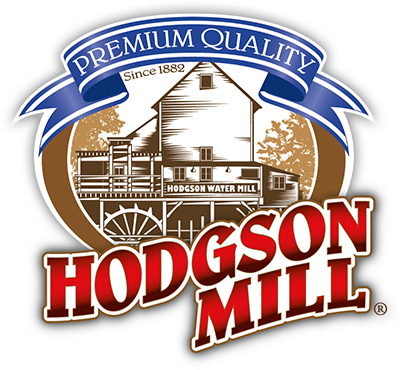Ingredient Questions
No, the leavening in our mixes is aluminum-free.
No, we do not use MSG in any of our products.
GDL stands for Glucono delta-lactone. This ingredient is a leavening which helps products rise when baked. It is made from sugar and it is aluminum-free.
Sorbitan Monostearate appears in the ingredient list of our yeast. It is used during the yeast manufacturing process. It is an emulsifier which protects the yeast from excess drying, and aids in rehydration of the yeast cells when it is time to bake.
Xanthan gum is a binder and stabilizer. It helps gluten free baked goods stick together, gives them structure, and helps keep them soft and moist. You’ll find our certified Gluten Free Xanthan Gum as an ingredient in some of our Gluten Free Mixes, and you can also buy our Gluten Free Xanthan Gum for your own baking needs. We use Xanthan Gum that is produced from corn.
A blog post was published in 2014 that theorized that the rising rates of wheat and gluten sensitivity was due to the “common practice” of farmers spraying fields of wheat with Roundup (active ingredient: glyphosate) just before harvest. We started receiving calls from our customers, and we immediately began to research and to talk with our suppliers to evaluate this claim. We can assure you:
- Spraying fields of wheat just before harvest is NOT a common practice (Estimated less than 2% of all wheat grown in US.)
- When it is necessary – in unusually wet conditions and areas with shorter growing seasons – it is regulated.
- We have close, long-standing relationships with our suppliers and producers, which is only possible because they have the same high quality standards that we hold for ourselves. We would not accept grains that do not pass our quality tests. We take Food Safety very seriously.
If you want to learn more, we suggest the following resources for further reading:
Whole Grains Council, “Myths Busted”
Snopes.com, "Roundup Wheat"
BestFoodFacts.org, "Is Wheat Toxic?"
About Our Process
It means that we use real stone to grind our flours and cornmeal - we have North Carolina pink granite millstones that grind grain the way it was done for many, many years. Stone mills stay cooler and gently grind the kernels to the perfec ttexture. Many modern mills use steel rollers, which crush the grain and can become very hot. Heat can harm the delicate oils and flavors in the whole grain. These mills are usually better suited for white, refined flour.
"Graham Flour" is 100% whole grain wheat flour - that means that when one pound of wheat goes into our millstones, one pound of flour comes out . You get the whole grain, expertly milled. (Some whole wheat flours are separated or recombined in different ratios after grinding. Some may be only 51% whole wheat since that is the federal requirement to be labeled "Whole Wheat.")
Many old recipes call for Graham flour - you can use our Whole Wheat Graham Flour anytime Graham flour is called for.
Our All-Purpose Flour is “unbleached,” because it has not been subjected to heat or chemicals like chlorine that remove the pigment (and perhaps nutrients) from the flour. Our All-Purpose Flour retains the grain's lightly creamy, ivory color, and may make your baked goods a slightly darker shade. Also try our Unbleached & Unenriched Cake Flour for light and tender cakes and cupcakes!
Gluten & Food Allergy Questions
We completely understand, and we strive to be very allergen-aware! On any Hodgson Mill product, check below the nutrition panel and ingredient list for information about how each of our items are produced, including any equipment shared with the top eight food allergens. Our Customer Service team is also happy to provide more information if needed.
Yes! We make gluten-free mixes, flours, and side dishes. You can view all of our Gluten Free Products in our Online Store.
Yes, they are. Our dedicated Gluten Free facilities and equipment lines also process no dairy or eggs.
We don't currently use sesame in any of our products.
Yes! Our yeast is gluten free and processed in the dedicated gluten-free facility. This production line is also free of the top 8 allergens (egg, soy, dairy, gluten, peanuts, tree nuts, meat and shellfish) and the entire facility is peanut-free and tree-nut free.
First, if you are extremely sensitive to gluten, (such as those diagnosed with celiac) you should clear everything with gluten out of your kitchen and cupboards. Even a tiny amount of gluten is enough to cause a reaction in some people. Check ingredient labels (even sauces, such as barbecue sauces and salad dressings may contain gluten). Stick to products that say “Certified Gluten Free,” with a Gluten Free symbol from a trusted certifying body, which means they have been tested to meet gluten free standards. Next, we suggest you plan your meals with care and find tasty gluten free substitutes for your favorite foods. The Celiac Disease Foundation (CDF) has many great resources and tips for people who need to eat a gluten free diet. Also check out the Gluten Free Resource Directory and the National Celiac Association.
About Our Products
A: Most of our certified products have the Non-GMO Project Seal on the packaging - in some cases, it may be a sticker (if the product was verified but we are in the process of updating the packaging). You can also check out our company listing at the Non-GMO Project website for the most up-to-date information on products that are verified or in process.
Yes! All the plastic packaging we use is BPA-free.
We are proud of our commitment to traceable ingredients and we value the Non-GMO Project's help in demonstrating this to our customers. Many people don't realize how stringent the Non-GMO standard is, and all the things it covers. Not only do we carefully source Non-GMO ingredients, but we remain vigilant in our production processes so our products don't get contaminated with any GM ingredients, such as through shared equipment or inferior ingredient quality.
It’s important to note that many products contain GMO ingredients even when not expected or obvious, and it's important to look at all inputs of each product. "Inputs" rather than "ingredients" means analyzing how individual ingredients are made. Also, many seemingly low-risk products may be at risk for containing GMO ingredients because a conventional and similar product of lesser quality may use filler ingredients that are GMO.
For example: conventional salt commonly contains dextrose as a processing additive, and dextrose is generally corn-based. GMO ingredients sneak into foods in lots of places that shoppers might not expect unless a full review of all of the ingredients is performed.
Another example: we cannot clean our granite millstones in such a way to completely prevent cross-contamination between non-GMO corn and GMO wheat — so we made the decision that we should source certified Non-GMO wheat in order to protect the status of the high quality corn we buy.
We go the extra mile to verify our products so that you, our customer, can rest assured that we are sourcing quality ingredients from trusted growers and suppliers.
Miscellaneous
The date stamped on our products is the "best used by" date. How do you read the code date? The first 2 numbers are the month, the next 2 are the day, and the last 2 are the year. The last digit (after the space) is a production number. Example: If you see a “use by” date of 050916 4, the use by date is May 9, 2016.(05/09/16, lot 4)
You can refrigerate or freeze our products to keep them fresh longer – refrigerating or freezing may extend the “use by” date by as much as six months. We recommend storing all of our products tightly sealed in a cool, dry place
Online Orders & Shipping
Yes, of course! Order via catalog, (request a catalog here) or shop online. You can also visit our Mercantile store.
If you need large quantities or bulk and food service sizes (25-50lb) then please get in touch, and learn more here.
Because of our strict food safety policies, we cannot accept returns of products that have left our warehouse. If you are dissatisfied, we are happy to offer a full replacement or a refund as long as you give us enough information to let us know what we can do better - mainly which product, the lot code/use-by date, your order details, and your feedback. Please get in touch with Customer Service to start the refund process. (And if the food is fine but you don't like the taste or performance of our product, we suggest you donate it to a local food bank.)
We have a flat-rate tier system based on your order amount.
Catalogs are not sent the same day they are requested. They are sent as bulk mail and may take 2-3 weeks to arrive. To request a catalog, please submit your name and address through our contact form.
Very! We do not keep a large inventory of flour and meals on hand, and we produce products to meet demand. That means you get them at maximum freshness and flavor. We also keep our flours in a "cold-room" (55-60 degrees F) until they are ready to ship.
We're very sorry this happened. It is a risk with any shipment. We will happily work with you to contact UPS, find out the circumstances, and when possible, send you replacement for your damaged products. Contact customer service.
We're sorry this happened and hope it arrives soon. As long as we sent your order in an acceptable window for it to arrive by the stated date, and it is delayed due to weather or work-related circumstances, then the fault lies with the shipping company. We regret that we cannot be responsible for that situation. You may take up the matter with the shipping company in question. If you contact customer service, we would be happy to be alerted, and we will both guide you through the claims process and do anything we can to make your next order better.


